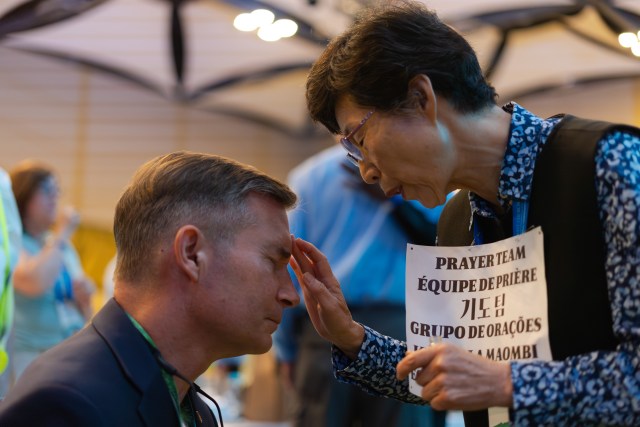Pornography use has continued to climb over the past decade, especially among young people who are exposed to explicit images earlier than ever. Yet most Americans today don’t see porn as a bad thing for society, and many Christians say they aren’t worried about its effects.
That’s according to a new report released this week from Barna and Pure Desire, a ministry for people with pornography addictions.
Researchers found that 61 percent of Americans say they view porn at least occasionally, up from 55 percent in Barna’s 2015 survey on the topic. More women are viewing porn than in the past (44% versus 39% nine years ago).
In the church, pastors are now more likely report a personal history of porn use (67% versus 57% nine years ago). Nearly 1 in 5 pastors say they currently struggle with porn. And among Christians who have attended services within the last month, more than half say they view pornography at least occasionally.
“Porn consumption is no longer confined to a specific demographic or subculture,” the report said. “It touches all segments of society (from young to old) with no regard to gender, social status or religious beliefs.”
The new data aligns with other research showing dramatic increases in the amount of online porn created and consumed over the last several years.
One recent study suggested 2.5 million people view online pornography every minute, and online porn consumption has increased by 91 percent since 2000. The increased availability, the ease of access to pornography on the internet, and even the social isolation exacerbated by the COVID-19 pandemic lockdowns are seen as major factors contributing to the uptick.
Some faith-based efforts to curb the growth of the online porn industry have advocated for legal restrictions, including a push for age-verification laws and stricter regulations on tech-device creators. Other ministries have focused on helping individuals overcome pornography habits.
Leaders from Barna and Pure Desire said they hope their research highlights the pervasiveness of pornography and encourages more pastors and church staff to prioritize support for those struggling. But the stats may reveal an even bigger hurdle: Many people, including Christians, don’t see any problem with it.
“Over three in five Christians (62%) tell Barna they agree a person can regularly view pornography and live a sexually healthy life,” the report reads. That’s only four percentage points behind the share of all US adults (66%) who don’t consider viewing pornography harmful.
Moreover, 49 percent of practicing Christians who admit to personally viewing pornography say they are “comfortable with how much pornography” they use.
“It’s just not a big deal to them … there’s no sense of urgency whatsoever,” said Sean McDowell, a professor at Biola University and host of the Think Biblically podcast. “I think this is an example where people are taking their cues far more from the culture and the ideas around us than Scripture and their Christian worldview.”
Yet, in the study, respondents who said they used porn at least semi-regularly were much more likely to report frequently feeling anxious, critical of themselves, easily overwhelmed, and depressed.
“There’s by and large a direct correlation between the more porn you watch and the less healthy you are mentally, emotionally, and relationally,” said Nick Stumbo, executive director at Pure Desire. “We can’t be fine with the behavior that’s undermining out mental, emotional, and relational health.”
A recent Institute for Family Studies/YouGov poll reported similar findings correlating porn use with loneliness and depression. Its researchers flagged widespread porn addiction as a public health issue, noting how porn sites “use similar techniques as social media platforms, such as infinite scroll, autoplay, and personalized content, to keep users engaged,” and how frequent users seek out more extreme videos as they become desensitized.
Barna’s report includes a series of questions focused on “betrayal trauma,” or the impact a person’s porn use has on their spouse or significant other.
The differences between men and women are stark. Women were at least twice as likely to say their partner’s porn use hurt their relationship in some way. Forty-four percent of women said they worried their partner was no longer attracted to them, the top concern. Yet same share of men—44 percent—reported no concerns about their partners’ porn use.
Then there’s the impact pornography has on young people. The report showed that 39 percent of Gen Z adults view porn daily or weekly. Plus, more than half of younger millennials and Gen Z adults (ages 18–37) say they have sent a nude image of themselves, and three-quarters say they have received them, Barna found.
Other recent studies have indicated that kids are seeing porn much earlier than previous generations—the average age for kids’ first exposure to pornography is now 12.
Stumbo said Pure Desire is developing training curricula for parents who are looking for ways to talk about pornography with their kids. But even that strategy faces hurdles: The Barna study asked respondents who or what has had the greatest impact on their views of sex and sexual behavior. “My mom” and “my dad” ranked lower than “my friends,” “television or movies,” “internet research,” and pornography itself.
“If you really want to help your teens, one of the best things you can do is address your own story and your own brokenness in your sexuality,” he said. “The healthier you get, the healthier you can help your teens get.”
McDowell said it’s important for churches to offer resources for people struggling with porn, even if they claim they don’t see a problem with it. The survey found that 83 percent of adults with a history of porn use have no one in their lives helping them avoid it.
“I suspect [Christians] aren’t looking at porn because they found the arguments against it unconvincing,” he said. “There’s often hurt, brokenness, there’s anxiety, there’s … underlying stressors and bad theology that prevents people from getting the help that they need.”
He recommends that in addition to teaching about healthy sexuality from the pulpit, every church should have a support group for people struggling with any kind of addiction, sexual in nature or not.
Juli Slattery, a psychologist and founder of Authentic Intimacy, agreed that offering a safe community for people struggling with pornography is key. She contibuted one of the experts weighing in on the report’s findings.
“You can tell people ‘God says stop looking at porn,’” Slattery wrote. “But if you don’t provide the tools and the community for them to address those deeper issues, a lot of people are going to feel really stuck. [Many Christians] don’t understand what’s being lost when sexuality is broken because they see sexuality more in terms of being a behavioral ethic and not a deeply spiritual battleground.”
Stumbo at Pure Desire said he’s noticed waning interest in hosting porn recovery ministries in churches over the past few years, following a boom of awareness and interest in the early 2000s.
The rise of the internet prompted the founding of several porn recovery ministries, including Covenant Eyes, which offers software to help people avoid online pornography, and XXXchurch. The issue continued to garner attention in the years that followed, especially after the release of the smartphone.
Barna’s previous survey on porn use, “The Porn Phenomenon,” came out in 2016. At the time, “it seemed to be a season where this bubble burst onto the scene and churches were like, ‘We’ve got to do something about pornography,’” Stumbo said. Two years prior, Pure Desire had released its popular Conquer Series, a porn addiction recovery video curriculum that’s now been viewed by more than 2 million men in more than 100 countries.
“Pure Desire grew a ton in those couple of years,” Stumbo said. Around that same time, in 2016, Covenant Eyes widened its mission and started partnering with other ministries to raise awareness about porn in the church. A year earlier, Christians founded Protect Young Eyes, a ministry to help schools and families create safe tech policies for kids.
Stumbo said focus on the issue has somewhat faltered since then: “As we look back … I think the church kind of moved on.”
The church’s perceived apathy toward pornography could inadvertently reinforce another common myth: Barna’s survey showed 66 percent of adults believe that “with enough willpower, a person can overcome porn addiction on their own.”
Like any addiction, however, the first step toward recovery is admitting to having a problem. If nearly two-thirds of Christians believe it’s possible to regularly view pornography and still live a healthy life, that first step may be the hardest.
The moral normalization of porn use could have one small upside: Barna CEO David Kinnaman said survey respondents are much more willing to be open and honest about their porn habits than they used to be—a helpful trend for social science researchers to capture the extent of the problem. He likened this openness to millennials’ and Gen Zers’ increasing openness about their mental health struggles.
“This kind of thing used to be harder to ask,” Kinnaman said. “It really is remarkable how honest people will be … especially online.”
Kinnaman said he hopes the study will convict pastors to attend to their congregations’ struggles with porn across all areas of discipleship. That means teaching a biblical view of sexual wholeness from the pulpit and fostering true community among small groups, where people can encounter an alternative to the “internal scripts” that allow them to rationalize their sins.
But he worries the problem isn’t going away anytime soon. Every survey prompts researchers to start brainstorming the questions they’ll ask next time, he said, and this one is no exception.
“We think we’re living in the porn age now,” he said. “Just wait until AI.”























































